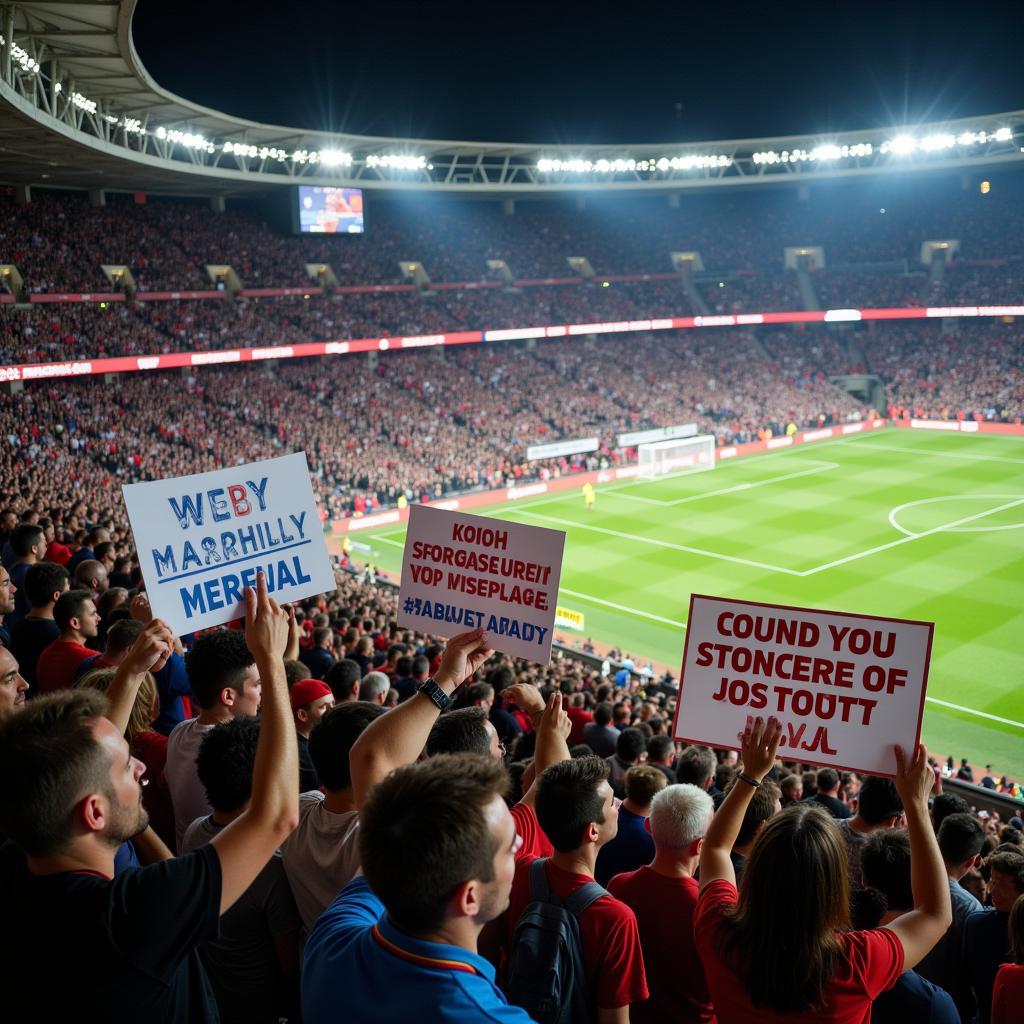Fan Demanded changes are a constant in the world of football. From managerial sackings to transfer decisions and even kit designs, the collective voice of the supporters can be a powerful force, shaping the direction of their beloved clubs. This article explores the fascinating dynamics of fan pressure and its impact on the beautiful game.  Fans protesting inside a stadium
Fans protesting inside a stadium
The Power of the Collective Voice: When Fans Demand Action
Football clubs, despite being businesses, are intrinsically linked to their fans. This emotional connection gives supporters a unique leverage. When fans unite, their collective voice can resonate louder than any individual complaint. This is especially true in the age of social media, where fan-driven campaigns can quickly gain traction and put immense pressure on club officials. Think about how quickly hashtags can trend and how online petitions can garner thousands of signatures in mere hours. This digital amplification of fan sentiment makes it harder than ever for clubs to ignore fan demanded changes.
Fan-Driven Managerial Changes
One of the most common manifestations of fan pressure is the demand for a managerial change. When a team consistently underperforms or the manager’s tactics are deemed ineffective, the fans are often the first to call for their head. Chants of “You’re getting sacked in the morning” are a familiar soundtrack to struggling teams, and online forums often buzz with discontent and calls for change. Sometimes, the pressure becomes so intense that the club has no choice but to succumb to fan demands, even if it means paying hefty compensation to dismiss a manager.  Manager facing press conference with fans protesting outside
Manager facing press conference with fans protesting outside
Transfer Market Influence: Fan Demanded Signings
Fans also exert influence in the transfer market. While the final decision rests with the club’s management, fan pressure can play a significant role in identifying transfer targets and pushing for deals to be completed. This is particularly evident with high-profile players. Supporters often use social media to directly appeal to desired players, urging them to join their club. Sometimes, this fan-driven campaign can sway a player’s decision, especially if they feel a strong connection with the club’s fanbase. You only need to look back at certain transfers to see how fan excitement and pressure can contribute to a deal coming to fruition. iniesta-vs-real-fans This pressure, however, can also backfire, leading to unrealistic expectations and disappointment if the desired signings don’t materialize.
The Dark Side of Fan Pressure: When Demands Turn Toxic
While fan pressure can be a positive force for change, it can also have a negative impact. Excessive criticism, online abuse, and even threats directed at players, managers, or club officials can create a toxic environment. This kind of behavior not only damages the reputation of the club but can also demoralize players and hinder their performance.
Balancing Act: The Club’s Dilemma
Clubs face a delicate balancing act. They need to listen to their fans and take their concerns seriously, but they also need to make decisions based on sound judgment and long-term planning. Succumbing to every fan demand can lead to instability and hinder the club’s progress. It is crucial for clubs to establish clear communication channels with their fans and to explain the rationale behind their decisions. Transparency and open dialogue can help to manage expectations and mitigate the negative effects of fan pressure.
Conclusion: Fan Demanded Change – A Force to be Reckoned With
Fan demanded changes are an integral part of the football landscape. The collective voice of supporters can be a powerful catalyst for positive change, pushing clubs to improve and become more responsive to the needs of their fanbase. However, it’s important to remember that fan pressure should be constructive and respectful. When demands turn toxic, they can damage the club and create a hostile environment for everyone involved. billboard-fan-army-2018 Ultimately, a healthy relationship between clubs and their fans requires open communication, mutual respect, and a shared passion for the beautiful game.
Expert Insights:
-
Dr. Adam Spencer, Sports Sociologist: “Fan pressure is a double-edged sword. It can be a powerful force for good, holding clubs accountable and driving positive change. However, it can also spiral into negativity, creating a toxic environment that harms the sport.”
-
Maria Sanchez, Football Journalist: “In the digital age, fan pressure has become amplified, with social media acting as a megaphone for supporter voices. Clubs can no longer afford to ignore fan demands, but they must also learn to manage expectations and filter out the noise.”
-
John Davies, Former Club Chairman: “Balancing the demands of the fans with the long-term interests of the club is one of the biggest challenges facing football executives today. It requires a delicate touch and a clear understanding of the club’s values and objectives.”
kristen-stewart-and-dakota-fanning-2016
diễn viên trà mi miệt thị fan kpop
When you need help, please contact Phone: 0903426737, Email: [email protected] Or visit: Lot 9, Area 6, Gieng Day Ward, Ha Long City, Gieng Day, Ha Long, Quang Ninh, Vietnam. We have a 24/7 customer service team.


